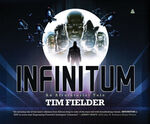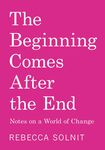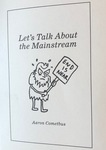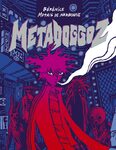
Here's from the publishier, Amistad:
Afrofuturism, a movement that began in the Black community during the early 20th Century as an escape from racial hostility, economic turmoil, and aggressive policing, is enjoying a renaissance witnessed by the record-breaking success of creative projects, including the Oscar-winning Marvel Studios film, Black Panther; Regina King’s Emmy-winning HBO superhero tale, Watchmen; Janelle Monae’s hit album, Dirty Computer; Jordan Peele’s provocative feature Get Out; Octavia Butler’s famed science fiction novel, Kindred; and Beyonce’s visual album Black Is King. Now comes Afrofuturist Tim Fielder’s beautifully written and rendered INFINITUM.
In INFINITUM, King Aja Oba and Queen Lewa are revered across the African continent for their impressive political and military skills. Yet the future of their kingdom is in jeopardy, for the royal couple do not have an heir of their own. When the King kidnaps his son born to a concubine, Obinrin, she curses Oba with the “gift” of immortality. After enjoying long, wonderful lives both, Queen Lewa and the crown prince die naturally, leaving the ageless bereaved King Oba heartbroken and alone. Taking advantage of Oba’s vulnerability, enemy nations rise to power and kill the king – or so they think. King Aja Oba survives the fatal attack, finally realizing the bitter fruit of Obinrin’s curse.
For millennia, the immortal Oba wanders the earth, mourning his lost subjects and searching for a new kingdom. His journey leads him across time, allowing him to witness the trans-Atlantic slave trade, the New World, and the American Civil Rights Movement. The expansion of global technology brings about intergalactic travel, first contact with an alien species, and conflicts within and ultimately outside the known universe. Thrust into these seminal events, Oba, now known by many as “John,” faces harrowing decisions that will determine mankind’s physical and spiritual trajectory.
In 280 plus stunningly emotional and evocative full-color images, INFINITUM presents a unique cosmic experience, addressing issues of racism, classism, gender inequity, the encroachment of technology and the spiritual cost of war, while exposing the history behind ancient mysteries.
Resources Author InterviewISBN: 9780062964083
ISBN 10: 0062964089
Imprint: Amistad
Format: Hardcover; 9 1/2" x 8"; Full Color Pages: 288 pages

FROM THE ARCHIVES
ONE NEW COPY of this full color, horizontally formatted, Afrofuturist graphic novel.
Here's the publisher description:
In INFINITUM, King Aja Oba and Queen Lewa are
revered across the African continent for their impressive political and
military skills. Yet the future of their kingdom is in jeopardy, for the royal
couple do not have an heir of their own. When the King kidnaps his son born to
a concubine, Obinrin, she curses Oba with the “gift” of immortality. After
enjoying long, wonderful lives both, Queen Lewa and the crown prince die
naturally, leaving the ageless bereaved King Oba heartbroken and alone. Taking
advantage of Oba’s vulnerability, enemy nations rise to power and kill the
king – or so they think. King Aja Oba survives the fatal attack, finally
realizing the bitter fruit of Obinrin’s curse.
For millennia, the immortal Oba wanders the earth,
mourning his lost subjects and searching for a new kingdom. His journey leads
him across time, allowing him to witness the trans-Atlantic slave trade, the
New World, and the American Civil Rights Movement. The expansion of global
technology brings about intergalactic travel, first contact with an alien
species, and conflicts within and ultimately outside the known universe. Thrust
into these seminal events, Oba, now known by many as “John,” faces harrowing
decisions that will determine mankind’s physical and spiritual trajectory.
In 280 plus stunningly emotional and evocative full-color images, INFINITUM
presents a unique cosmic experience, addressing issues of racism, classism,
gender inequity, the encroachment of technology and the spiritual cost of war,
while exposing the history behind ancient mysteries.
About the author:
A native of Mississippi, Tim Fielder is an illustrator, cartoonist, animator and OG Afrofuturist. He is the founder of Dieselfunk Studios, an intermedia storytelling company, and is an educator for institutions such as the New York Film Academy and Howard University. Tim has served clients such as Marvel, Tri-Star Pictures, Ubisoft Entertainment, and the Village Voice, and is known for his TEDx Talk on Afrofuturism. He won the prestigious 2018 Glyph Award, and his work has been showcased in the Hammonds House Museum, Exit Art and NYU Gallatin Gallery. He attended Jackson State University, School of Visual Arts, and New York University. He lives in New York City.
ISBN: 9780062964083

We'd heard tell that Hurston had something like this in her unpublished papers. Now, at last, 90 years after these notes were first set down on paper, Hurston scholar, Deborah G. Plant has assembled them into this volume. Barracoon is, as it's subtitle states, the story of the last "black cargo." We'll let the jacket notes take it from here:
In 1927, Zora Neale Hurston traveled to Plateau, Alabama, to visit eighty-six-year-old Cudjo Lewis, a survivor of the Clotilda, the last slaver known to have made the transatlantic journey. Illegally brought to the United States, Cudjo was enslaved fifty years after the slave trade was outlawed.
At the time, Cudjo was the only person alive who could recount this integral part of the nation's history. As a cultural anthropologist, Hurston was eager to hear about these experiences firsthand. But the reticent elder didn't always speak when she came to visit. Sometimes he would tend his garden, repair his fence, or appear lost in his thoughts.
Hurston persisted, though, and during an intense three-month period, she and Cudjo communed over her gifts of peaches and watermelon and gradually Cudjo, a poetic storyteller, began to share heartrending memories of his childhood in Africa; the attack by female warriors who slaughtered his townspeople; the terrors of being captured and held in the barracoons of Ouidah for selection by American traders; the harrowing ordeal of the Middle Passage aboard the Clotilda as "cargo" with more than one hundred other souls; the years he spent in slavery until the end of the Civil War; and finally his role in the founding of Africatown.
'Nuff said.
softcover










